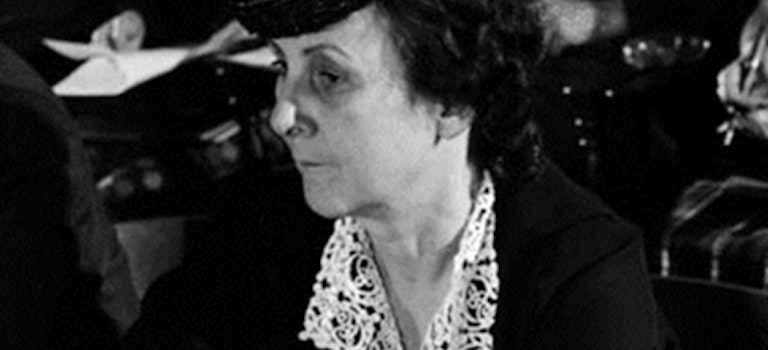What you were never told about the UN Charter: Latin American women fought hard for references to gender equality
Did you always take Article 8 of the Charter for granted ? It reads :
The United Nations shall place no restrictions on the eligibility of men and women to participate in any capacity and under conditions of equality in its principal and subsidiary organs.
And did you ever stop to consider whether the “equal rights of men and women” mentioned in the Preamble were included in early drafts?
With women representing only 3 per cent of all delegates to the San Francisco conference in 1945, the inclusion of references to their rights in our founding document was never a given. It took determination, patience and courage on the part of a few resolute Latin American delegates. Minerva Bernardino, from the Dominican Republic, and Bertha Lutz, from Brazil, fought hard during those crucial weeks in San Francisco. They were branded as “extremist feminists” and told that referring to women in the Charter would be “vulgar”. But Ms. Bernardino and Ms. Lutz were not deterred. They persisted, pleaded, insisted and prevailed. They were remarkable diplomats. The British delegate, initially reluctant to any “feminist” language in the Charter relented after he was told this would honour the bravery of the British women during WWII.
These anecdotes and much more information have been unearthed by Fatima Sator and Elise Dietrichson, two researchers with the University of London School of Oriental and African Studies (SOAS), who presented their findings to a full house of diplomats and activists at an event held at the Palais des Nations during #WomensWeek by the permanent mission of Brazil with the support of the International Gender Champions. Fatima and Elise noted that the contribution of Eleanor Roosevelt to the Universal Declaration of Human Rights had been widely acknowledged but that language on human rights was first introduced in the charter by Bertha Lutz in 1945. Participants agreed that the the world should honour Ms. Lutz, Ms. Bernardino and the other Latin American women delegates as they were the real pioneers that promoted the idea of gender equality in the UN Charter.
Ambassador Azevêdo of Brazil who is also an International Gender Champion, suggested, in the wake of the Oscar ceremony, that a feature film should be produced on the work of these extraordinary women. In the meantime, how about honouring them with a plaque, a permanent exhibition or a reference on the UN website?
Ce qu'on ne vous a jamais dit sur la Charte des Nations Unies: des femmes latino-américaines se sont battues pour obtenir des références à l'égalité entre les sexes
Avez-vous toujours tenu pour acquis l'article 8 de la Charte? Il est libellé comme suit:
Aucune restriction ne sera imposée par l’Organisation à l’accès des hommes et des femmes, dans des conditions égales, à toutes les fonctions dans ses organes principaux et subsidiaires.
Vous êtes-vous déjà demandé si « l’égalité de droits des hommes et des femmes » mentionnée dans le préambule a été inclue dans les premières ébauches du texte? Les femmes ne représentant que 3 % des délégués à la Conférence de San Francisco en 1945, l'inclusion de références à leurs droits dans le document fondateur de notre Organisation n' était pas gagnée d’avance. Il a fallu la détermination, la patience et le courage de quelques déléguées latino-américaines. Minerva Bernardino, de la République dominicaine, et Bertha Lutz, du Brésil, se sont battues avec acharnement pendant ces semaines cruciales à San Francisco. Elles ont été qualifiées d' "extrémistes féministes" et onleur a dit qu'il serait "vulgaire" de parler des femmes dans la Charte. Mais Mme Bernardino et Mme Lutz ne se sont pas découragées. Elles ont persisté, plaidé, insisté et ont prévalu. C'étaient des diplomates remarquables. Le délégué britannique, d'abord réticent à tout langage "féministe" dans la Charte, l’a accepté après qu'on lui ait dit que c'était un hommage à la bravoure des femmes britanniques pendant la Seconde Guerre mondiale.
Fatima Sator et Elise Dietrichson, deux chercheuses de la « School of Oriental and African Studies (SOAS) » de l’Université de Londres, ont mis au jour ces anecdotes et beaucoup plus d'informations encore. Elles ont présenté leurs trouvailles à un groupe de diplomates et d’activistes lors d'un événement organisé au Palais des Nations pendant la Semaine Internationale de la Femme (#WomensWeek) par la mission permanente du Brésil avec le soutien des Champions internationaux de l’égalité des sexes. Fatima et Elise ont noté que la contribution d'Eleanor Roosevelt à la Déclaration universelle des droits de l'homme avait été largement reconnue, mais que le langage sur les droits de l'homme avait été introduit pour la première fois par Bertha Lutz en 1945. Les participants ont convenu que le monde devrait aussi rendre hommage à Mme Lutz, Mme Bernardino et aux autres déléguées latino-américaines, car elles furent les véritables pionnières qui promurent l'idée de l'égalité des sexes dans la Charte des Nations Unies.
L'Ambassadrice Azevêdo du Brésil a suggéré, à la suite de la cérémonie des Oscars, qu'un long métrage sur le travail de ces femmes extraordinaires soit produit. En attendant, pourquoi ne pas leur rendre hommage par une plaque, une exposition permanente ou une référence sur le site de l'ONU?
